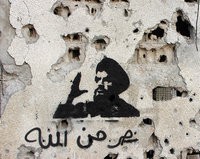Since it was founded in 1982, in the aftermath of the Iranian Revolution and in reaction to Israel’s invasion of Lebanon, Hezbollah has been many things: a terrorist group, a sectarian militia and, most recently, a legitimate political actor in Lebanon. Today, the so-called Party of God faces challenges on all sides. Its archenemy and raison d'être, Israel, is as strong as ever; its Syrian and Iranian patrons are struggling; and a regional Sunni ascendancy threatens its regional popularity and domestic legitimacy. At near-peak strength just a few years ago, Hezbollah now finds itself in dangerously uncertain waters.
Hezbollah has spent the past decade moving away from its original sectarian role as a rigid and puritanical Shiite militia, and the effort to mainstream its image has served the group well. In 1992, it joined Lebanon’s political process and participated in elections, a move that has gradually earned it sizable influence over key state institutions and appointments, culminating in the 2011 elections, when a Hezbollah-led coalition government came to power. Moreover, as the only group exempted from Lebanon’s post-civil-war disarmament per the 1989 Taif Agreement, Hezbollah maintains its domestic legitimacy only to the extent that it represents the paramount “resistance” force to Israel. Turning its weapons on Sunnis, as it has done only sporadically in the past, could imperil this critical source of strength.
The Syrian uprising is threatening to undo this decade-long effort, foreshadowing a dangerous future for Hezbollah. The past few years have rebalanced the Middle East in ways hostile to Shiites. Hezbollah initially tried maneuvering with the Arab Spring by praising the Tunisian and Egyptian uprisings, but unlike Hamas, which closed its Syrian offices and distanced itself from Bashar al-Assad, Hezbollah’s support of Syria’s embattled president has put it on the wrong side of an empowered Sunni street. Hezbollah is now identified less for its anti-Israeli credentials than for its role in supporting a vicious dictator slaughtering Sunnis.

